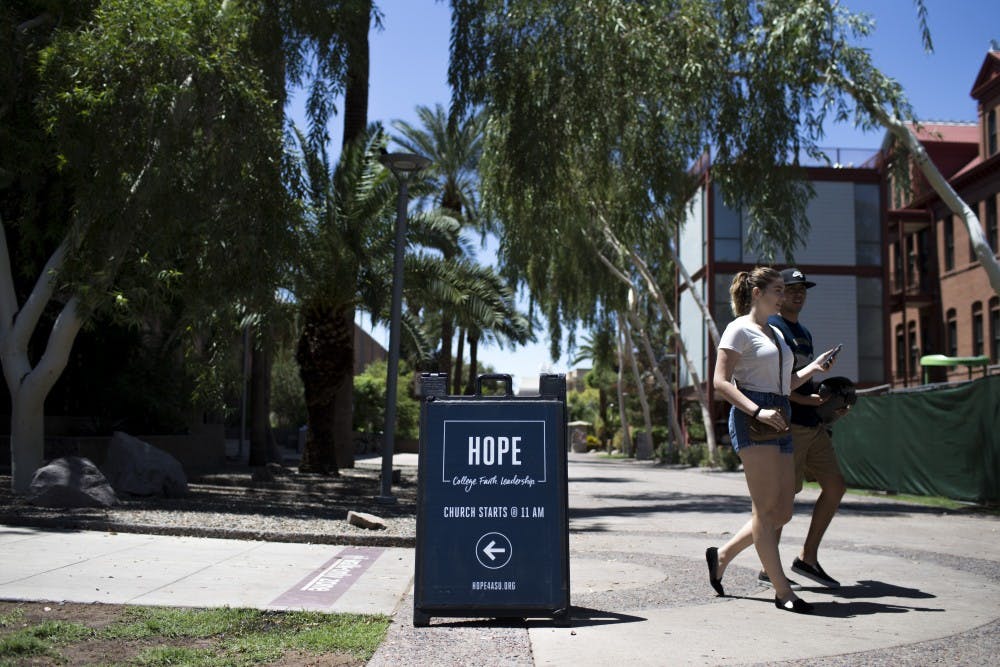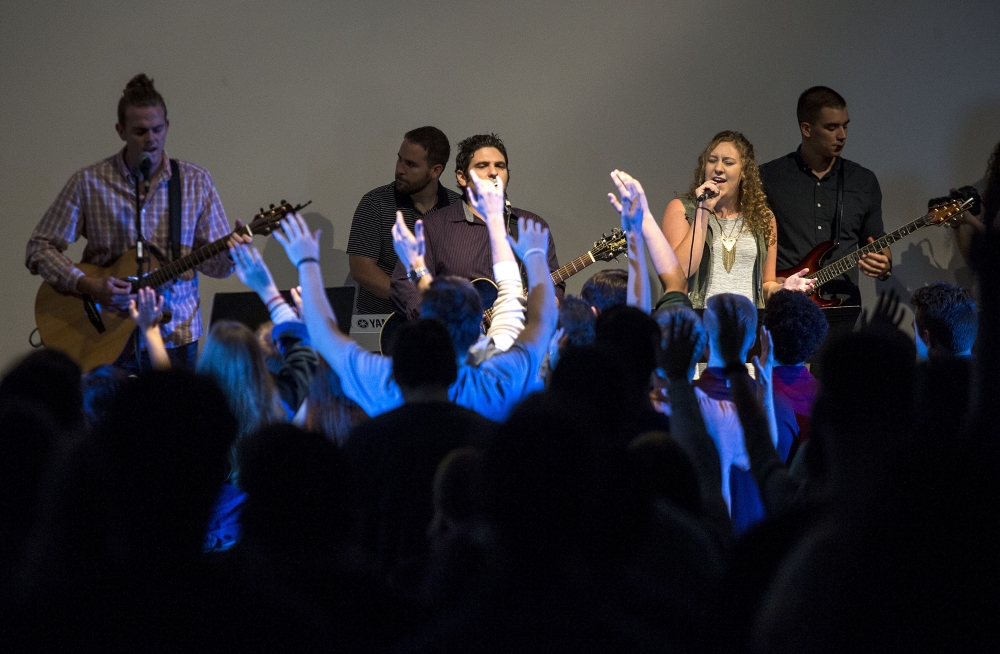Hope Church has undergone misconduct investigations, the revocation of its religious council membership and the loss of free gathering spaces on campus over the last year.
It has been undeterred by these developments: It will continue to recruit students, hold services on campus and operate its affiliated clubs. The State Press spoke to 20 people in all levels of ASU and the Church to determine how this continued presence will affect the University.
One of the most significant developments to hit the Church in recent months was an investigation by the Office of Student Rights and Responsibilities that determined in June that Hope broke several code of conduct policies governing hazing, club registration and residence hall solicitation.
Due to the resulting sanctions, Hope Church is not currently in good standing with ASU; both parties have said they are continuing to hold meetings to clarify the specifics of the sanctions.
Hope’s senior pastors declined to be interviewed, but spokesman Ricky Ruedaflores provided a statement on behalf of the Church.
“Hope Church is dedicated to serving the ASU community and will continue to do so this year,” the statement read. “At this time, we will be renting space to hold on campus services to welcome students who are looking to express their faith in college.”
Read more: ASU investigation finds Hope Church violated policies
The University has a policy of not commenting on pending investigations, but provided a general statement on Hope’s future on campus.
“Any organization that has been sanctioned by the university has the ability to work towards regaining good standing,” part of the statement read. “... The university continues to work with Hope Church to help them fully understand the errors they made. If, after four years, they have demonstrated consistent adherence to all university policies during that time, they will be back in good standing with the university.”
One former Hope Church member, who spoke on the condition of anonymity, said he thinks this period of uncertainty has fueled Hope to work harder.
“They’re seeing it as a way to look at God in a new way and reach out to new people,” the former member said. “In some weird, twisted way they’re looking at this as a new opportunity to grow.”
At least one repeated violation
Of the five clubs that were sanctioned by the University in February, only Sun Devil Survivor and Sun Devils Wear Prada re-registered as student organizations this year. Outlaw Comedy, Wow Factor and Man Up have not registered, according to ASU officials.
While all five violated a policy governing the sharing of student contact information, Sun Devil Survivor was the only club to also violate an ASU policy on residence hall canvassing, according to investigation documents.
It has continued to enter dorms as recently as last month even after ASU put the group on probation in February for doing so, according to its former advisor, Paul Steinbart.
Previously unreleased investigation documents, which were recently obtained by The State Press, have shown that ASU told the clubs unequivocally in February that they are not allowed to enter dorms uninvited.
Club president Brian Smith Jr. — the son of Hope Church founder Brian Smith Sr. — and the rest of the club’s officers provided a statement that did not confirm or deny the violations before publication.
Sun Devil Survivor issued another statement after publication that denied the violation.
“Our club, Sun Devil Survivor didn’t violate any University policies over the summer and we feel as though our former advisor either was misinformed or misread the email that came from ASU,” Smith Jr. said in the statement.
The University has a policy of not discussing ongoing investigations, but an ASU official said it monitors groups under sanctions closely.
“We cannot comment on any ongoing investigations, but because we monitor groups that are under sanction very closely, when they step out of line, we know,” said an ASU official, who wasn’t authorized to discuss the matter publicly.
Steinbart, who was the club’s faculty advisor until he resigned on Saturday, said he was got an email from ASU on July 13 that said Sun Devil Survivor had been “violating a trespass.”
Not to be confused with criminal trespassing — which is a crime under Arizona law and enforced by police — ASU officials have repeatedly used the term when describing the clubs’ infraction of ASU’s rules about the dorms.
According to ASU policies, only signed-in guests of residents are allowed in the University’s dorms; each guest must provide a valid of form of identification and must be escorted by his or her host at all times. These policies were also printed verbatim in a determination letter sent by ASU to Hope Church on June 6.
Steinbart said he was unaware Sun Devil Survivor members had broken the rules again, and didn’t even know that the club had been under ASU investigation until the July email from the University.
“I was kept out of the loop … that’s the first time I knew they’d even been trespassed,” he said.
The Office of Student Rights and Responsibilities' procedure is to work directly with a club’s student officers — rather than automatically contacting the faculty advisor — when conducting an investigation, said an ASU official who wasn’t authorized to speak publicly about the issue.
Steinbart said his club members chose not to tell him that they were under investigation.
“I’m only getting information back from the club when I press them for something. Nobody is forthcoming,” Steinbart said.
Steinbart said he isn’t a member of Hope Church and didn’t know that Sun Devil Survivor was being operated in conjunction with the Church until after he agreed to be the faculty advisor.
He said he didn’t regularly attend meetings or its annual retreat, and resigned on Saturday to focus on his work as a professor in the W.P. Carey School of Business information technology department.
Mission 72
One of Hope’s largest annual campus recruiting efforts is underway already, according to Church documents obtained by The State Press.
Mission 72 — an initiative where church members try to make contact with freshman within their first 72 hours on campus — will happen again this fall, according to former and current members who are familiar with Hope’s plans.
While addressing newcomers during Sunday’s service, senior pastor and church founder Brian Smith stressed the importance of engaging with religion during those initial days.
“I consider you heroes because the first 72 hours you went to church,” he said. “That’s one of the best decisions you can make in the first 72 hours of being at ASU. Statistics show that the first 72 hours in many ways set the trajectory of a student’s life.”
Hope Church will continue to make this effort to connect with students as they arrive on campus this week, according to the documents and current members.
Read more: Hope Church voted out of CORA
One of the documents — which were distributed to members during a recent church meeting — listed over 30 campus events planned for the month of August.
The documents call for members to volunteer for “Hope Campus Welcome” recruitment events, and mainstay ASU welcome-back events such as Move-in Weekend, Taylor Fest, Passport to ASU and the ASU football home opener versus New Mexico State later this month, according to the documents.
Paying for space
Hope’s service on Sunday was held in an auditorium in the Life Sciences Center building, which is where Hope normally holds its summer services.
But programs handed out Sunday said the Church intends to return to Neeb Hall next week.
As a member of CORA, it was allowed to hold events there for free. But now it will now have to pay just over $3,500 a day to rent it, according to the ASU Classroom Scheduling department. The Life Sciences Center auditorium is around $3,000 a day.
Hope has also been paying for ASU police officers to provide security for its services for around a year, according to the department.
“Internal or external groups that wish to hire an ASU Police officer for general security at an event may do so at the overtime rate of $64 per hour,” read a statement from the department. “Hope Church has hired an ASUPD officer in the past, and did so this past weekend as well.”
According to recent financial documents, Hope has ended several recent years in the black: Financial data collected by the Evangelical Council for Financial Accountability showed that Hope ended 2015 — the last year data was available — with $29,230 in excess funds, or 1.8 percent of its total budget.
Hope collected more than $1.5 million in cash donations in 2015, compared to just over $1 million in 2013, according to the financial documents. But its expenses have kept pace and it’s unclear what that additional money is being spent on.
Attendees at Sunday's service were encouraged to tithe, which is usually 10 percent of one’s yearly salary.
Affecting the faith
Several Hope Church members said the religious direction of Hope’s congregation — which averages a few hundred students and alumni per service — has remained steadfast.
“When I’m going in there, everyone is still joyful, has a positive attitude,” Hope Church member Clayton Brenner said. “We have our religion, to meet people, to love people and share our faith with them. I don’t think that changed at all.”
Carissa Leonard said she has seen Hope adapt its operations when necessary, but the Church has always been committed to its larger direction.
“Over the past four or five years I have been with Hope, there have been small changes here and there for improvement and to make sure we’re respecting ASU policies … but as far as our overall mission, it has been very consistent,” she said.
Hope’s mission and faith statements are listed on its website, which also says its board of directors has the final say on how it will direct its faith.
“For purposes of Hope Church’s faith, doctrine, practice, policy and discipline, our Board of Directors is Hope Church’s final interpretive authority on the Bible’s meaning and application,” according to its website.
None of Hope’s five board members — which include a former ASU associate vice president and a former digital campaign director for John McCain and Newt Gingrich — could immediately be reached for comment on whether the Church’s religious direction will change in the near future.
Editor's note: This story has been updated with an additional statement issued by Sun Devil Survivor.
Reach the reporter at reillykneedler@gmail.com or follow @reillykneedler on Twitter.
Like State Press on Facebook and follow @statepresss on Twitter.






